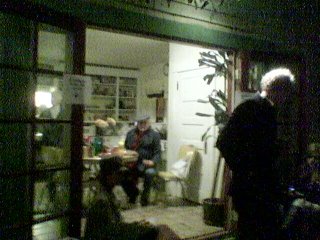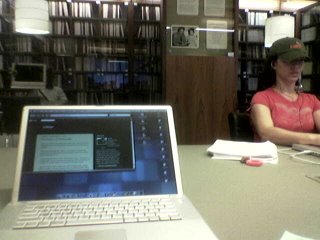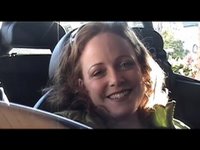Movies - and - Television.
Of course, I'm interested in more - like theatre and advertising (am I schitzo or what?) - but, I still get the look from anyone and everyone who is just meeting me, or considering me for a job. It's a look that says, I know why you're really here - you want to be a famous well-paid writer of good movies and interesting tv shows.
The silent conversation between the eyeballs continues:
My eyes say: Um, well, yes, of course, who wouldn't?
Their eyes say: Yeah, yeah, you think you're a hot shot, don't you?
My eyes say: Not exactly, I'm just you know trying to learn.
Their eyes say: You're just like a million other people. And chances are you'll disappear just like them.
And my eyes say: You know, I'm just trying here. I'm really not copping an attitude. I just...
And so on.
Eventually actual words are spoken and those words are: Do you have a spec script?
My answer is: I have three movie scripts and no TV scripts.
There are several very logical reasons for this lopsideness.
The first is, I LOVE MOVIES. I mean, really, there is just nothing better than making a date of disappearing into a chair in the darkness with a few hundred other souls and giving it up for sound and light arranged to passionately tell a story.
The second is, when you write a spec movie script you might have to follow some formulas and formats but the characters and story are all yours: You're not beholden to anything before you in that way.
Not so for TV. Here the spec needs to demonstrate an understanding and mastery of the rules, a knowledge of all that's gone before, plus your own flair for writing.
The third is, I have never watched much TV.
Simply put, I've been a very active boy and really never made time for it. Why should I have? Frankly speaking, the television shows of my generation (DALLAS, MAGNUM PI, CHARLIES ANGELS, LOVE BOAT, CANNON, COLUMBO), well, they were never truthful about anything. Just contrived and fake, fake, fake all the way through. Consequently, they sucked. There were exceptions - I liked Star Trek for it's wooden directness, for instance. And the Roseanne Show. But I simply don't get the love people carry like a credential for most of the television programming of the 70s and 80s. Even the sitcoms I hated for their over-written-ness and their slavish schtickyness. Every once in a while Newhart had something - but it was in the pause, not the words. And then, the laugh tracks. Don't get me started...
It was not until the 90s that televsion began to look like anything interesting to me. I still recall seeing Law & Order for the first time and being fascinated with riding a story through the justice system's digestive track. I couldn't get enough.
My attraction to TV got another bump with The Sopranos, Deadwood and 6 Feet Under - and finally The Shield, The Wire and now Rome and Friday Night Lights (the best and most truthful drama on a network).
And so, being tired of saying that I don't have a TV spec - and knowing that TV by far employs more writers than movies do - I have decided to throw my hat into the ring.
To that end I have done two things. The first started when I got here: Regular visits to the WGA to read TV scripts.
And I have to say, I've been greatly relieved to find I LIKE READING THESE STUPID THINGS.
In fact, I only wish I'd started earlier. You see, a good TV script flies by like a good pulp novel. It's direct and informal at once. Always economical and has a tremendous sense of pacing.
My particular favorites have been episodes of HOUSE and MEDIUM. Both have very simple A/B story structures and crystal clear lead characters.
HOUSE is great and I've got a lot respect for its writers. I believe you actually have to know medicine to write it. To me, anyway, no episode has ever read as if the technical crap was just dressing. To the contrary, knowledge of it drives the action as much or more than the soap opera relationships happening around events.
MEDIUM, however, is a show I prefer because it is actually a show about the social change that has occured in the two income household throughout America. Allison Dubois has all the responsibilities usually associated with the male's role in the house. She has the star job. She protects her family. She provides leadership.
While her husband, a rocket scientist, is almost always a step behind. If not more.
Yet no one is dumb. And more to the point, despite the absurdity of the hook, the show balances the right amount of skepticism and evidence to be something you can swallow. (Most of the time.)
So which one am I going to try my hand at first?
 MEDIUM, of course.
MEDIUM, of course. Plus Arquette looks eerie.
And eerie is always good.
NEXT: I take a UCLA extension course for Dramatic Writing and start an outline. OOOF.



































